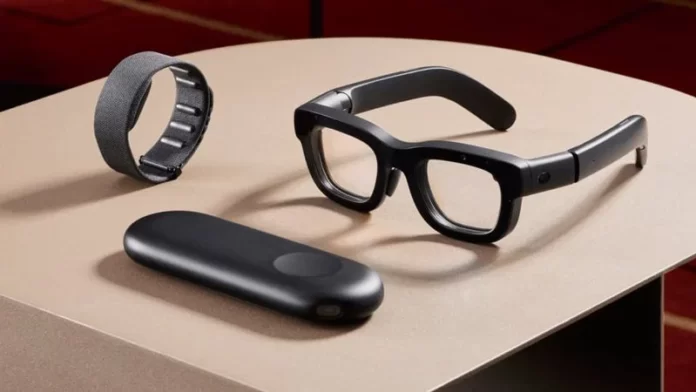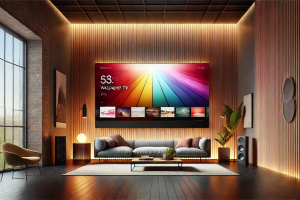Meta AR Glasses: Zuckerberg’s ‘Time Machine’ Prototype and the Future of Augmented Reality
Meta, the parent company of Facebook, has long been a leader in social media, but in recent years, it has shifted focus toward the immersive world of augmented reality (AR) and virtual reality (VR). The most recent revelation is a prototype of the Meta AR glasses, a product that CEO Mark Zuckerberg has dramatically referred to as a “time machine” to the future. These Meta AR glasses are expected to be revolutionary, blending augmented reality with artificial intelligence (AI) to offer unprecedented digital interactions in everyday life. In this blog, we will delve into the Meta AR glasses prototype, their features, potential release date, and how they compare to similar products in the market.
Meta AR Glasses: Prototype and Vision
The term Zuckerberg AR glasses may sound futuristic, and in many ways, it is. At its core, Meta’s AR glasses are being designed to bridge the gap between the real and digital worlds, much like Meta’s VR devices. However, AR glasses aim to overlay digital information and experiences directly into your physical environment, creating a seamless blend of the two realities.
Meta has already showcased prototypes of these AR glasses, and while details about the full feature set remain scarce, we do know that these glasses will integrate both AI and AR functionalities, making them a standout in the growing field of wearable tech.
The concept behind this Meta time machine is to allow users to interact with digital interfaces without being confined to a screen. From attending meetings to interacting with social media, these glasses could transform how we communicate, learn, and work in the future.
Key Features of Meta AR Glasses
- Heads-Up Display (HUD): One of the standout features expected from the Meta AR glasses is a HUD that projects information, notifications, and interactive content into the user’s field of view. This display could be used for navigation, notifications, or even entertainment without the need for additional devices like a smartphone.
- AI Integration: Meta has confirmed that the glasses will incorporate AI technology, which can help users access information more intuitively. For example, the AI assistant could analyze the environment in real-time, offering contextual information or even translating languages through voice commands.
- 3D Content: With the growing emphasis on AR, Meta’s glasses are expected to project 3D content into the user’s surroundings, transforming how we experience everything from educational tools to entertainment. It could allow users to interact with 3D models, such as examining a historical monument or dissecting a virtual organism.
The integration of these features positions the Meta AR glasses as a significant leap from traditional augmented reality experiences, combining both artificial intelligence and AR in a way that’s accessible to the average consumer.
Meta AR Glasses Release Date and Price
While Meta has yet to officially confirm the Meta AR glasses release date, industry speculation suggests we may see the first consumer models within the next few years. Meta is expected to offer more insights into these glasses at their annual Meta Connect event, where significant advancements in AR/VR technology have been unveiled in the past.
Expected Pricing
Pricing is another crucial question. Meta has remained tight-lipped about the Meta AR glasses price, but given that AR technology is still relatively cutting-edge, the cost could be substantial. The company may follow a tiered pricing strategy, offering different models at various price points, much like they’ve done with their VR headsets.
However, it’s important to note that Meta will face stiff competition in this space, with existing AR devices like the XReal Air and Rokid already on the market at prices ranging from $500 to $1,500. Meta’s challenge will be to offer an AR device that is not only affordable but also packed with cutting-edge features that justify the price(XR Today) .
How Do Meta AR Glasses Compare to Meta Orion AR Glasses?
Before unveiling the current prototype, Meta had already been working on another AR project, codenamed Meta Orion AR glasses. While the Orion glasses laid the groundwork for Meta’s foray into AR, the Meta AR glasses prototype takes things a step further, integrating more advanced AI functionalities and refined hardware.
Design and Build
The earlier Meta Orion AR glasses featured a bulkier design, focusing more on industrial use cases rather than everyday consumer interactions. The new Meta AR glasses prototype, on the other hand, is expected to be sleeker and more stylish, with Meta looking to offer an aesthetic similar to traditional eyewear—just as they did with their Ray-Ban smart glasses.
Meta’s collaboration with LG to integrate OLED screens into their future XR products also suggests that the Meta AR glasses will feature some of the most advanced displays in the industry(XR Today). This could make the glasses lighter and more comfortable while still delivering a high-quality visual experience.
Features and Performance
Both the Meta Orion AR glasses and the Meta AR glasses prototype will feature similar core functionalities—such as displaying AR content—but the newer model is expected to take things further. The integration of more sophisticated AI features in the Meta AR glasses could allow for more natural interactions, making tasks like pulling up information, translating text, or navigating unfamiliar environments as simple as speaking a command.
Meta AR Glasses Review: What the Industry is Saying
While the Meta AR glasses review is still speculative, given that the product has yet to be officially released, early impressions from developers and those familiar with Meta’s work suggest that the glasses will be a game-changer for both consumers and businesses alike.
The glasses are expected to offer a seamless user experience, integrating into the user’s daily life while also providing a range of new AR-based applications. Whether you’re navigating city streets, attending virtual meetings, or immersing yourself in 3D content, the Meta AR glasses are poised to change the way we interact with technology.
Meta Connect AR Glasses Announcement: What to Expect
Meta’s annual Meta Connect event has become a key platform for the company to showcase its advancements in both virtual and augmented reality technologies. This year’s Meta Connect AR glasses announcement is expected to provide more details on the official release date, price, and feature set of the Meta AR glasses.
During previous Meta Connect events, we’ve seen glimpses of Meta’s vision for the future of XR (Extended Reality), including the introduction of the Meta Quest Pro VR headset. If Meta follows the same pattern, the Meta AR glasses could make their debut on a similar stage.
What to Look for at Meta Connect
- Further Prototype Details: Expect Meta to release more concrete details on the specs and functionality of their AR glasses, particularly how they will differ from competitors.
- Pricing and Release Date: One of the most anticipated pieces of information will be the pricing strategy and when consumers can expect to get their hands on the product.
- New Use Cases for AR: Meta may also introduce new use cases for AR technology, specifically how their AR glasses will integrate with Meta’s social media platforms and business services.
Meta’s Time Machine to the Future
The Meta AR glasses prototype promises to be much more than a simple gadget—it represents Meta’s vision of the future. By blending AR and AI, the Meta time machine glasses could revolutionize how we interact with our surroundings, offering a digital overlay of useful information in real-time.
As we await more details, one thing is certain: the Meta AR glasses are set to be a pivotal product, and with Zuckerberg’s commitment to a future defined by AR, this “time machine” may be closer than we think.
For more updates on the latest tech developments, visit Regent Studies.
For additional insights into Meta’s AR strategy, check out this article on Meta AR Glasses Prototype from XR Today(XR Today).




